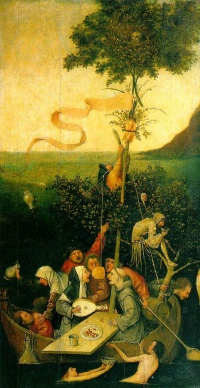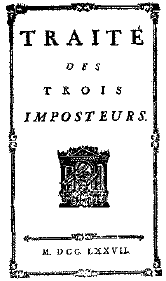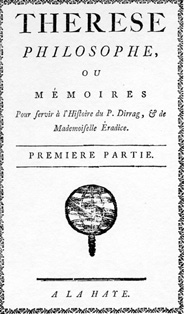Religious satire
From The Art and Popular Culture Encyclopedia
|
"But if cattle and horses and lions had hands [...]" --Xenophanes "...religion, politics, and sexuality are the primary stuff of literary satire. Among these sacred targets, matters costive and defecatory play an important part. ... from the earliest times, satirists have utilized scatological and bathroom humor. Aristophanes, always livid and nearly scandalous in his religious, political, and sexual references..." --The Modern Satiric Grotesque and its Traditions by J. R. Clark |
|
Related e |
|
Featured: |
Religious satire is a form of satire targeted at religious beliefs. From the earliest times, at least since the plays of Aristophanes, religion has been one of the three primary topics of literary satire, along with politics and sex.
Religious satire can be the result of agnosticism or atheism, but it can also have its roots in belief itself. Religious satire is of all ages, from Lucian in Antiquity to Geoffrey Chaucer, Desiderius Erasmus and Lucas Cranach the Elder in the Renaissance, to Monty Python's Life of Brian in the 20th century.
Contents |
History
Antiquity
Lucian's religious satires include "The Gods in Council" and "Zeus Tragoedus". He also wrote mockingly on the followers of Jesus.
Middle Ages
A part of Medieval satire, the satire of religion was celebrated in parody masses such as the sermon joyeux and during the risus paschalis.
See also the Speculum Stultorum (Mirror for Fools), 12th c. satire of monks and universities
Renaissance
During the Renaissance, protestants used satire and parody to ridicule Catholicism. A good example is Martin Luther's anti-Semitic and antipapal pamphlets.
More examples:
- Collection of stories The Canterbury Tales (14th century) by Geoffrey Chaucer
- Essay The Praise of Folly (1509) by Desiderius Erasmus
- Cymbalum Mundi (1537) is a religious satire by Bonaventure des Périers, written as a collection of philosophical dialogues.
- Satire of Divine providence in Giordano Bruno's 'The Expulsion of the Triumphant Beast' (1584)
- Paintings such as The Monk and the Nun (1591) – Cornelis Cornelisz van Haarlem
- Satire Ménippée (1594), a satirical work in France during the Wars of Religion
17th century
Enlightenment
- The Shortest-Way with the Dissenters (1703) by Daniel Defoe advocated religious toleration by means of an ironical exaggeration of the highly intolerant attitudes of his time.
- Novel A Tale of a Tub (1704) by Jonathan Swift
- Persian Letters (1721) by Montesquieu
- The novella L'Ingénu (1767) by Voltaire
- Robert Burns poem Holy Willie's Prayer (1785), which is an attack on religious hypocrisy
- Libertine novels such as Thérèse Philosophe,a roman a clef and ridiculing the clergy
20th century
- Wise Blood (1952) by Flannery O'Connor, satirizing contemporary religious attitudes
- Inherit the Wind (1955), which fictionalizes the Scopes Monkey Trial of the 1920s
- Letters from the Earth (1962), book of essays by Mark Twain
- Zarquon is a legendary prophet from Douglas Adams' The Hitchhiker's Guide to the Galaxy (1978) who was worshipped by a small number of people. His name was used as a substitute for "God."
- The film Monty Python's Life of Brian (1979)
- The film Dogma by Kevin Smith (1999)
- Ned Flanders of The Simpsons is a zealot who practices sola scriptura
- South Park has satirized Christianity, Mormonism, Judaism, Islam, Scientology, and other religions
- Family Guy has satirized elements of Christianity and other religions in several episodes
- The controversial "Islamophobic" Jyllands-Posten Muhammad cartoons (2005)
Reactions, criticism and censorship
Religious satire has been criticised by those who feel that sincerely held religious views should not be subject to ridicule. In some cases religious satire has been censored - for example, Molière's play Tartuffe was banned in 1664.
The film Life of Brian was initially banned in Ireland, Norway, some states of the USA, and some towns and councils of the United Kingdom. In an interesting case of life mirroring art, activist groups who protested the film during its release bore striking similarities to some bands of religious zealots within the film itself. Like much religious satire, the intent of the film has been misinterpreted and distorted by protesters. According to the Pythons, Life of Brian is not a critique of religion so much as an indictment of the hysteria and bureaucratic excess that often surrounds it.
The issue of freedom of speech was hotly debated by the UK Parliament during the passing of the Religious Hatred Bill in January 2006. Critics of the original version of the Bill (such as comedian Rowan Atkinson) feared that satirists could be prosecuted, but an amendment by the House of Lords making it clear that this was not the case was passed - by just one vote.
In 2006, Rachel Bevilacqua, a member of the Church of the SubGenius, known as Rev. Magdalen in the SubGenius hierarchy, lost custody and contact with her son after a district court judge took offense at her participation in the Church's X-Day festival.
Richard Dawkins frequently points out that there is no reason to exclude religion from objective studying as any other social phenomena.
References
- Parody in the Middle Ages: The Latin Tradition, 1996, Martha Bayless.
- Paul Lehmann, Die Parodie im Mittelalter, Munich, 1922.
- Eero Ilvonen, Parodies de themes pieux dans la poesie franchise du moyen age, Paris, 1914.
- Francesco Novati, La Parodia sacra nelle letterature moderne, in Studi Critici, Turin,
See also
- Atheism
- Anti-clericalism
- Criticism of religion
- Discordianism
- Freedom of speech versus blasphemy
- Humor about Catholicism
- Parody religion
- Religious censorship




